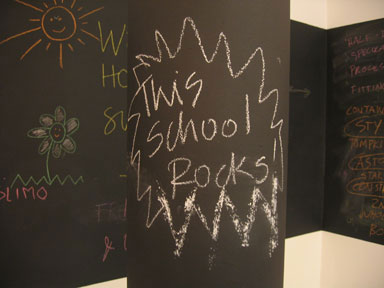
HOMEWORK is a collaboration between artists Ditte Lyngkaer Pedersen, Carlos Motta, Lize Mogel, and Jeuno J.E Kim. Conceived as a study group, an editorial team and a curatorial collaborative, HOMEWORK investigates relationships between art and “the political”, education and politics, process and product.
We have varied interests and unique individual practices, but share a common ground in our critical engagement with the sociopolitical structures explored in their singular artistic manifestations and curatorial projects.
Aside from two physical meeting points in 2007, we use Skype every Tuesday as a classroom for discussion and artwurl.org as a discursive exhibition space to share our dialogues with a wider public. PS122 Gallery (NY) and Århus Kunstbygning (DK) are involved as exhibition spaces for physical manifestations encapsulating the creative process and presentations that went into and came out of our doing “homework”.
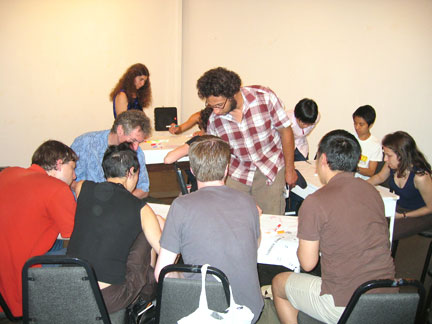
The title HOMEWORK suggests various levels of meaning. First, there is the literal usage of the word “homework,” a school assignment to be done at “home” in order to practice ones’ understanding of the subject learned. Second, we thought about the words HOME and WORK, thinking about them as spaces antithetical to each other. Home is where one returns from work because one had to leave home to go to work. Related to this is the relationship of work done at home, which has often been devalued or illegitimated compared to work in the public sphere. As artists and others in precarious labor situations, the line is often blurred between the public/private spaces as sites for production.
Contesting the purported neutrality of education, HOMEWORK aims to examine and engage in alternative pedagogical models to understand the larger historical context, learn to think from within the confronted problem, and to develop creative responses. HOMEWORK is a project based on processes, where each homework is a self-initiated assignment to practice our continuous critical engagement with notions of the “political.”
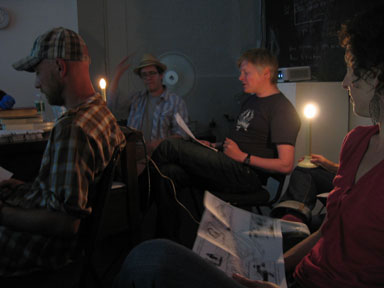
Curriculum
Focus: The Political
By implementing a “school” structure, HOMEWORK is constructed
to emulate a knowledge colony whose members serve as both teachers and
students, where each participant conducts and applies various research
models to understand better the idea of the “political”
and what it means to be a politically engaged cultural producer. We
implement an educational vocabulary and structures to contextualize
our focus on the process without a pre-determined product. Underlying
the project is an indirect call for analyzing educational settings as
necessary prescribed spaces for freedom of thought that can breed critical
thinking within an organic growth and exchange of knowledge between
artists.
There has been a proliferation of exhibitions, articles and works that claim to be politically engaged. The rise of neo-liberalist policies and constricting political climates affect all sectors of society, and cultural producers have a specific obligation to address what is being produced, discussed and censored in the arts. To deal with this reality has become the locus of many artistic practices. Within such a context, a danger also arises where the “political” and activist-oriented cultural practices become fetishes or trends. The discourse of art has operated and structured itself along certain lines of intellectual thought such that when artists or curators are called upon to state the “political” the issue can become depoliticized, functioning only as a prop for inadequate and amateur analyses that leads to a dead end. What does the “political” mean then in the context of the visual arts?
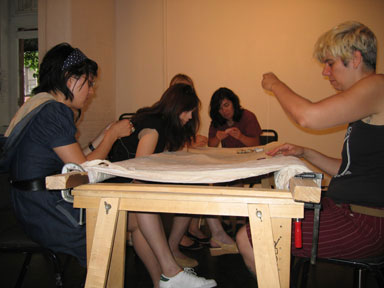
Curriculum
Focus: The Pedagogical
With the tide of capitalistic systems, schools have become incubators
for generating professionalized workers that fit the efficient producer
profile. It is a fact that specializations in universities have been
corporatized, ensuring that research deemed worthy of analysis is dictated
by its market value. To break this trend, what kind of educational settings
in art can resist commodification and become appropriate situations
for what Gayatri Spivak has termed to be a process of “unlearning”?
This led us to look at different pedagogical strategies used by artists,
to create a program of learning and producing knowledge whose nexus
is criticality rather than a subscription to any dogmatic paradigm.
We also focus on education and specifically how art education is affected by the corporatizing of schools and the rise of knowledge based industries in NY and DK. Given the nature of artists’ precarious labor, they often seek employment as art teachers. While this condition may have risen out of economic necessity, it is also a position of power where artists deliver and share their know-how with the next generation. We are interested in examining the emergence of alternative educational programs and groups, artists using pedagogical methods in informal ways, as well as artist collectives who creates spaces for "educational" exchanges that attempt to apply democratic methods of communication and learning.
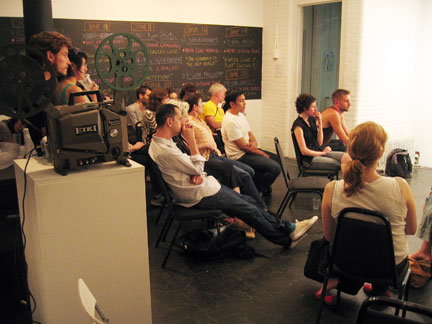
The
End: See you!
As a research unit, it is necessary for our collaborations to take place
on site, as well as at a distance. In May-June 2007, Jeuno JE Kim and
Ditte Lyngkær Pedersen were in residence in New York. In August
2007, Lize Mogel and Carlos Motta were in residence in Århus.
